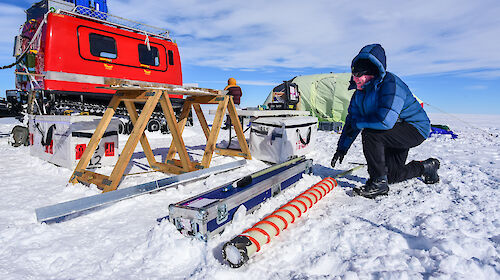Expeditioners from four nations with neighbouring stations in East Antarctica have gathered for the inaugural ‘International Conference on Antarctic Research (ICAR)’.
ICAR — a neat acronym that also stands for the participating nations India, China, Australia and Russia — was held at Bharati station on Friday 17 January.
Four stations in the Larsemann Hills region of East Antarctica — Davis (Australia), Progress (Russia), Zhongshan (China) and Bharati (India) — were represented at the day-long meeting.
Coordinating scientist at Davis research station, Dr Cath King, said the event was an excellent opportunity to share information about Australia’s science activities with other nations active in East Antarctica, particularly in the Larsemann Hills region.
“It underlines the value we place on international collaboration for scientific research to understand and protect Antarctica,” Dr King said.
Among the Australian team were a marine geoscientist from Geoscience Australia, a senior forecaster from the Bureau of Meteorology, and research scientists from the Australian Antarctic Division.
Presentations about Australia’s Antarctic Science Program included:
· the broad themes of Australia’s strategic scientific priorities, namely the role of Antarctica and the Southern Ocean in global climatic processes, and Antarctic conservation and management;
· the Antarctic Near-shore and Terrestrial Observation System, an international biologically-focused initiative to coordinate assessment of environmental variability and change;
· risk assessment and remediation of contaminants in Antarctica;
· geoscience activities to support mapping, research and environmental management;
· weather forecasting services, ozone monitoring, and meteorological research;
· atmospheric studies to improve the accuracy of climate and weather forecast models.
ICAR attendees comprised four Russian expeditioners from Progress station, 16 Chinese expeditioners from Zhongshan station, more than 30 expeditioners from Bharati station, and eight Australians from Davis station.
“Our thanks to Bharati station for hosting this get-together, and we look forward to continuing collaboration,” Dr King said.
“We also encouraged everyone to attend the international meetings of the Scientific Committee on Antarctic Research (SCAR) and Council of Managers of National Antarctic Programs (COMNAP) to be held in Hobart this year.”
More information: a report from Davis station in Icy News.







